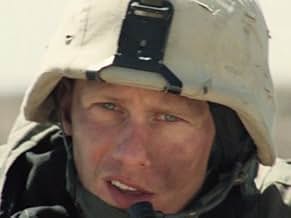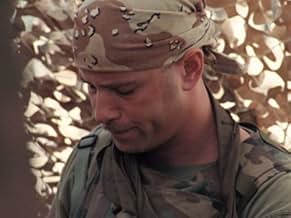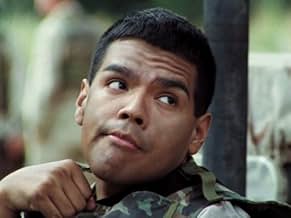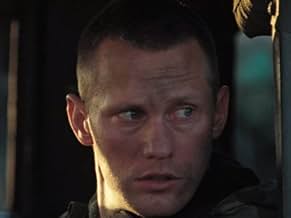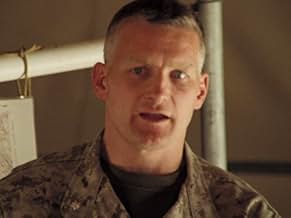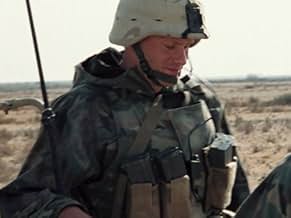Un giornalista di Rolling Stone, assegnato al Primo Corpo di Riconoscimento dei Marines, racconta le sue esperienze durante la prima ondata dell'assalto guidato dagli Stati Uniti a Baghdad n... Leggi tuttoUn giornalista di Rolling Stone, assegnato al Primo Corpo di Riconoscimento dei Marines, racconta le sue esperienze durante la prima ondata dell'assalto guidato dagli Stati Uniti a Baghdad nel 2003.Un giornalista di Rolling Stone, assegnato al Primo Corpo di Riconoscimento dei Marines, racconta le sue esperienze durante la prima ondata dell'assalto guidato dagli Stati Uniti a Baghdad nel 2003.
- Vincitore di 3 Primetime Emmy
- 14 vittorie e 22 candidature totali
Sfoglia gli episodi
Recensioni in evidenza
As a US Marine I can pretty much relate to everything that went on in this series... From the banter among low ranks, to the stupid games we have to endure, to living in terrible conditions, it's all here. To weapons jamming and MRE's, this series really has it all. The thing that caught my attention was how they captured the terrible leadership at times from the powers that be. I'm here to tell you there is some pitiful officers leading men into battle. And then you have some outstanding NCO's that make things happen. This series shows it all and from my perspective, this is probably as close as it gets to the real thing. Wanna be a United State Marine? This will give you a little insight on what it's like after bootcamp. Some great actors in this show and have to give all the credit to the producers and director. Guarantee they had real Marines on set making sure they got things as accurate as they were allowed. This was a solid solid series and will watch it again and again... man I miss being around my Brothers and everything that goes with being a Marine... Semper Fi Rudy!!!
Every Marine that I know who's read this book, and the couple that have caught the first episode has nothing but good things to say about the material. David Simon and Ed Burns did a great job of sticking to the heart of Wright's story--and from what I've heard, even referenced Lt. Fick's personal account (One Bullet Away)--of that deployment as well. As an active duty Sergeant in the USMC, most of my enlistment has involved working with and managing the same kind of colorful personalities seen in GK. I lost track of how many times we laughed at random "unfunny" scenes because the accuracy of the mannerisms, terminology, or situations depicted.
The one thing that caught me off guard was, after watching all the HBO trailers, the lack of music. I kept expecting to hear that campy trailer music sprite up the background, but it never happened. Oh well, you can't win em all.
YOU WILL ABIDE BY THE GROOMING STANDARD.
The one thing that caught me off guard was, after watching all the HBO trailers, the lack of music. I kept expecting to hear that campy trailer music sprite up the background, but it never happened. Oh well, you can't win em all.
YOU WILL ABIDE BY THE GROOMING STANDARD.
What you get to see here is a one-of-a-kind mini-series: this is as close to a documentary as it gets. The realities of modern warfare are shown honestly with no political agenda and you are left to draw your own conclusions.
When I watched this series I remembered a quote from another film, 'The Siege' from 1998, where Bruce Willis' character, a high ranking army official, says something along the lines of: "The army is a broad sword - not a scalpel. So trust me, you do not want to call the army, unless you have absolutely no other option".
From an artistic point of view what stands out the most is the ensemble of actors. Not once during the entire seven episodes did I not believe I was watching the actual characters - the performances and the direction in this production are flawless. I've never seen a series that felt as real as this.
This goes beyond mere entertainment - this is simply the best contemporary television has to offer. 10 out of 10.
Favorite films: http://www.IMDb.com/list/mkjOKvqlSBs/
Lesser-known Masterpieces: http://www.imdb.com/list/ls070242495/
Favorite Low-Budget and B-Movies: http://www.imdb.com/list/ls054808375/
Favorite TV-Shows reviewed: http://www.imdb.com/list/ls075552387/
When I watched this series I remembered a quote from another film, 'The Siege' from 1998, where Bruce Willis' character, a high ranking army official, says something along the lines of: "The army is a broad sword - not a scalpel. So trust me, you do not want to call the army, unless you have absolutely no other option".
From an artistic point of view what stands out the most is the ensemble of actors. Not once during the entire seven episodes did I not believe I was watching the actual characters - the performances and the direction in this production are flawless. I've never seen a series that felt as real as this.
This goes beyond mere entertainment - this is simply the best contemporary television has to offer. 10 out of 10.
Favorite films: http://www.IMDb.com/list/mkjOKvqlSBs/
Lesser-known Masterpieces: http://www.imdb.com/list/ls070242495/
Favorite Low-Budget and B-Movies: http://www.imdb.com/list/ls054808375/
Favorite TV-Shows reviewed: http://www.imdb.com/list/ls075552387/
Proof that "Generation Kill", the miniseries produced by HBO films and written by David Simon and Ed Burns, their first project after the end of their television landmark "The Wire", a series which is completely incomparable in quality and scope to anything which has come before or since, is too intelligent to be concerned with simplistic political sloganeering, blind patriotism, or taking an anti-militaristic stance is the reaction which the political extremes have had to it. Any person with far right views I've spoken to or read on the internet has said similar things: this movie emasculates the marines and turns them into bleeding heart liberals (presumably because the film, and I will be referring to this as a film from this point onwards because it's definitely as much a film as "Berlin Alexanderplatz" is, has the guts to portray them as having compassion for wounded or killed civilians), and any person with far left views I've spoken to has apparently found the film to be immoral, presumably because it portrays men who spew violent, racist, homophobic, and misogynist invective as human beings.
In fact, "Generation Kill" is the farthest thing from either celebrating the military or being anti-militaristic. Like on "The Wire", David Simon and Ed Burns are on the side of the working class, as Kent Jones in Film Comment points out, and they have no interest in making a moral judgment on the nature of the work they're portraying, whether it's teaching, politics, drug dealing, or invading a country. Like Simon went beyond portraying drug dealers on "The Wire" to transporting us to their world and showing us their own problems, their own moral standards, their own worries and concerns, and introduced us to their own vernacular, he does the same with the marine corps in "Generation Kill". Like "The Wire", this is cunning and clever drama: it is political without taking sides, concerned with the inefficiency and bad planning coming 'from above' but without putting the blame on any individuals. It portrays people, some less likable and morally or politically correct than others, but people.
The only thing keeping "Generation Kill" from truly being a military version of "The Wire" is that its comparatively limited scope- it takes place within the first, 'triumphant' week of the invasion, and focuses pretty much only on one group of people. I'm entirely convinced that Simon could have written a thoroughly engrossing and fascinating drama about the Iraq war which extended past these five days, one which would have taken us past the marine corps into the lives of the other military units involved in the invasion, and the higher-ups as well, as he did starting in season 3 in "The Wire". As it stands, this is not a limitation of the power which "Generation Kill" holds, but a masterstroke in its success of making its point: every element which has made the situation in Iraq so chaotic was present in a latent form from the beginning. The film is not even really making a moral judgment of the war in Iraq, if anything it supports a well-executed version of it: most of the Iraqis we see, nearly 90% of them, are incredibly grateful, at least at this early stage, for being relieved of Saddam's rule.
Moreover, no American marine or any Iraqi is portrayed simplistically as a 'bad guy' or 'good guy', not even the bloodthirstiest of the Americans, and this writing is brought to life admirably well by the mostly perfect cast and the excellent direction and production value (it is obviously not a big-budget Hollywood film, but it still achieves real authenticity in almost every regard- the closest I came to disbelieving it was when a few Iraqis were portrayed as darker-skinned than any I've seen). The closest thing to a villain in the film is Saddam himself, who makes no literal appearance outside of posters on the streets, but then again he is pretty much the closest thing to a movie 'bad guy' in reality.
"Generation Kill" is, like "The Wire", ultimately a workplace drama about workplace politics. That the stakes are higher and that the innocent are killed even more often than they are on "The Wire" is irrelevant to the writers. This may make "Generation Kill" boring to those accustomed to and expecting a more standard war film, one which attempts an anti-war or pro-war statement. Like "The Wire" again, what the viewer is left with in the end is only a dislike of unnecessary violence and casualties, and a portrayal of the toll they take on those involved in either perpetrating the violence or those related to the victims. Both "The Wire" and "Generation Kill" are dramatically built on disappointment and disillusionment with the system in place itself, and like "The Wire" it is all about bad decisions, mistakes, and the rare good decision. The film ends with a montage and a song, much like every season of "The Wire", and with its subtle summation of the hours gone by and its emotional impact it cements David Simon's status as one of the greatest and most important writers of our time.
In fact, "Generation Kill" is the farthest thing from either celebrating the military or being anti-militaristic. Like on "The Wire", David Simon and Ed Burns are on the side of the working class, as Kent Jones in Film Comment points out, and they have no interest in making a moral judgment on the nature of the work they're portraying, whether it's teaching, politics, drug dealing, or invading a country. Like Simon went beyond portraying drug dealers on "The Wire" to transporting us to their world and showing us their own problems, their own moral standards, their own worries and concerns, and introduced us to their own vernacular, he does the same with the marine corps in "Generation Kill". Like "The Wire", this is cunning and clever drama: it is political without taking sides, concerned with the inefficiency and bad planning coming 'from above' but without putting the blame on any individuals. It portrays people, some less likable and morally or politically correct than others, but people.
The only thing keeping "Generation Kill" from truly being a military version of "The Wire" is that its comparatively limited scope- it takes place within the first, 'triumphant' week of the invasion, and focuses pretty much only on one group of people. I'm entirely convinced that Simon could have written a thoroughly engrossing and fascinating drama about the Iraq war which extended past these five days, one which would have taken us past the marine corps into the lives of the other military units involved in the invasion, and the higher-ups as well, as he did starting in season 3 in "The Wire". As it stands, this is not a limitation of the power which "Generation Kill" holds, but a masterstroke in its success of making its point: every element which has made the situation in Iraq so chaotic was present in a latent form from the beginning. The film is not even really making a moral judgment of the war in Iraq, if anything it supports a well-executed version of it: most of the Iraqis we see, nearly 90% of them, are incredibly grateful, at least at this early stage, for being relieved of Saddam's rule.
Moreover, no American marine or any Iraqi is portrayed simplistically as a 'bad guy' or 'good guy', not even the bloodthirstiest of the Americans, and this writing is brought to life admirably well by the mostly perfect cast and the excellent direction and production value (it is obviously not a big-budget Hollywood film, but it still achieves real authenticity in almost every regard- the closest I came to disbelieving it was when a few Iraqis were portrayed as darker-skinned than any I've seen). The closest thing to a villain in the film is Saddam himself, who makes no literal appearance outside of posters on the streets, but then again he is pretty much the closest thing to a movie 'bad guy' in reality.
"Generation Kill" is, like "The Wire", ultimately a workplace drama about workplace politics. That the stakes are higher and that the innocent are killed even more often than they are on "The Wire" is irrelevant to the writers. This may make "Generation Kill" boring to those accustomed to and expecting a more standard war film, one which attempts an anti-war or pro-war statement. Like "The Wire" again, what the viewer is left with in the end is only a dislike of unnecessary violence and casualties, and a portrayal of the toll they take on those involved in either perpetrating the violence or those related to the victims. Both "The Wire" and "Generation Kill" are dramatically built on disappointment and disillusionment with the system in place itself, and like "The Wire" it is all about bad decisions, mistakes, and the rare good decision. The film ends with a montage and a song, much like every season of "The Wire", and with its subtle summation of the hours gone by and its emotional impact it cements David Simon's status as one of the greatest and most important writers of our time.
10johnha-1
As a former Marine who was deployed to the same place at the same time, I think this show did an excellent job of capturing the 'essence' of what the invasion of Iraq was like to the men who were there. This show comes closer to accurately portraying wartime Marines than any other show I've ever seen. I think this is as close as Hollywood can get short of being there and filming it live. Sometimes the special effects are a little over the top, but the dress, demeanor and dialog of the characters are very accurate.
The attitudes, bearing, and language of the Marines portrayed are spot on, as well as the day to day problems and trials they encounter. I guess what I really like about this show is the lack of cheesy moto propaganda. The films are light on pro- or anti- war propaganda and heavy on truth. I'm sure some people think that the 'get some' attitude of the Marines glorifies the war while others think that pulling no punches in the collateral damage department is anti-war, but that isn't the case. These films boldly show the invasion of Iraq for what it was, for better or worse. The Marines have 'get some' attitudes in this show because Marines really have that attitude. Collateral damage, chaos and confusion among U.S. forces are in the show because it really happens in warfighting.
The attitudes, bearing, and language of the Marines portrayed are spot on, as well as the day to day problems and trials they encounter. I guess what I really like about this show is the lack of cheesy moto propaganda. The films are light on pro- or anti- war propaganda and heavy on truth. I'm sure some people think that the 'get some' attitude of the Marines glorifies the war while others think that pulling no punches in the collateral damage department is anti-war, but that isn't the case. These films boldly show the invasion of Iraq for what it was, for better or worse. The Marines have 'get some' attitudes in this show because Marines really have that attitude. Collateral damage, chaos and confusion among U.S. forces are in the show because it really happens in warfighting.
Lo sapevi?
- QuizOn the DVD audio commentary, David Simon recalled Neal Jones's somewhat unorthodox audition for the role of Sgt. Major Sixta. According to the story, Jones entered the audition room, immediately began screaming his lines unintelligibly - much like his character does - and then walked out of the room without another word. As he opened the door to leave, he winked at casting director Alexa L. Fogel, and she realized she had the right actor for the role.
- Citazioni
Cpl. Gabe Garza: Hey. There's kids holding hands.
Sgt. Brad 'Iceman' Colbert: Oh cute. Don't shoot 'em, Garza.
- ConnessioniFeatured in The 61st Primetime Emmy Awards (2009)
I più visti
Accedi per valutare e creare un elenco di titoli salvati per ottenere consigli personalizzati
Dettagli
- Colore
- Proporzioni
- 1.78 : 1
Contribuisci a questa pagina
Suggerisci una modifica o aggiungi i contenuti mancanti

![Guarda Trailer [OV]](https://m.media-amazon.com/images/M/MV5BMzAyZGM1ZmItYmFkOS00Zjk1LWEzNDEtMWFhMTlkNzRhYzUxXkEyXkFqcGdeQXRyYW5zY29kZS13b3JrZmxvdw@@._V1_QL75_UX500_CR0)

